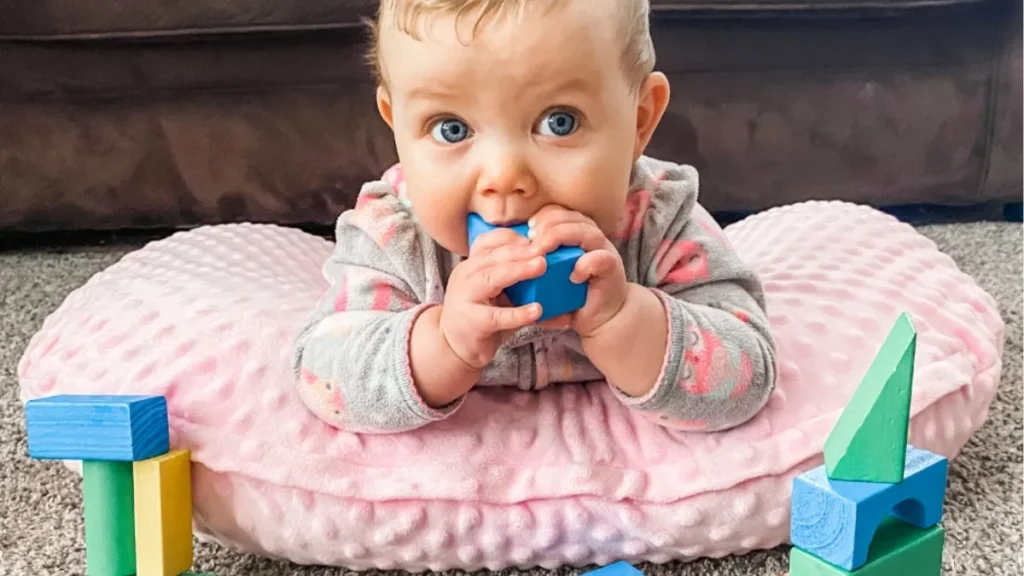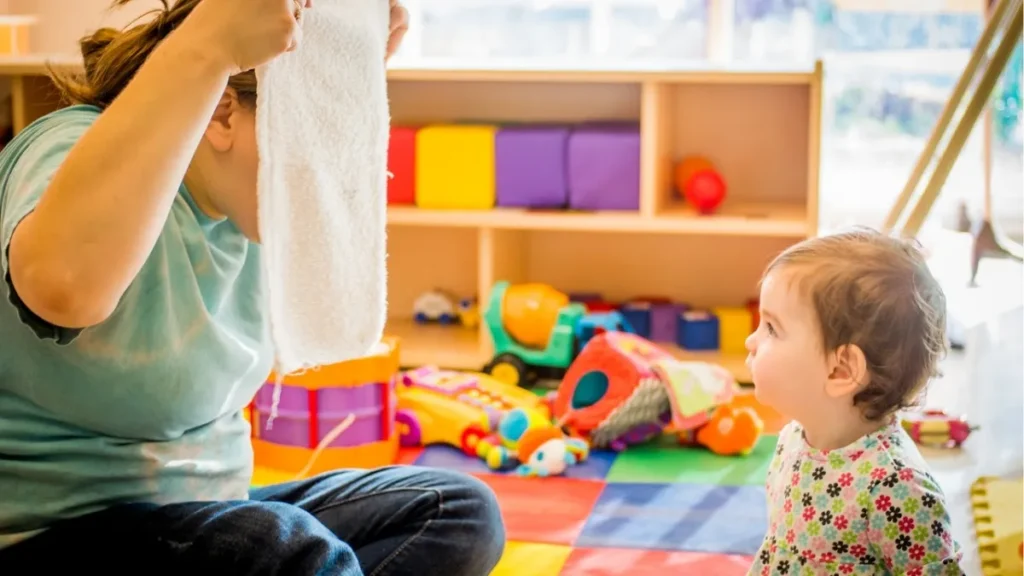At nine months old, your baby is no longer a helpless newborn but a mini adventurer, crawling, grasping, and reaching out to explore the world with boundless curiosity.
This exciting stage is filled with rapid development, both physical and cognitive, and your role as a parent is to provide a stimulating environment that supports their natural learning journey.
But what exactly should you be teaching your nine-month-old?
What To Teach A 9 Month Old – Table Of Contents
Forget about flashcards and structured lessons; at this stage, the greatest lessons are learned through playful exploration and engaging interactions. Here are some key areas to focus on and practical activities to ignite your little learner’s spark:
1. Fostering Physical Development: Crawling, Climbing, and Grasping Their Way to Mastery

Nine-month-olds are on the move! Crawling, pulling themselves up on furniture, and exploring every nook and cranny becomes their daily mission. Here’s how to encourage this essential physical development:
- Create a safe and stimulating crawl space: Clear any floor hazards and create a designated area with soft mats, low obstacles to climb over, and toys that encourage movement.
- Engage in tummy time: Place your baby on their tummy for short periods throughout the day to strengthen their neck and back muscles. Make it fun with colorful mirrors, rattles, or textured books.
- Support pulling and climbing: Let your baby explore furniture safely, providing sturdy surfaces to hold onto and encouraging their natural curiosity. Offer climbing structures or toy ladders under adult supervision.
- Playful movement activities: Sing and dance with your baby, engage in peek-a-boo games, or encourage them to follow you as you crawl or roll around. Remember, laughter is the best medicine!
2. Nurturing Sensory Explorations: A Symphony for Tiny Senses

A nine-month-old’s world is a sensory playground. They use their hands, eyes, ears, and even their mouths to understand and interact with their surroundings. Here’s how to fuel their sensory journey:
- Provide a variety of textures: Let your baby touch crinkly fabrics, smooth wooden blocks, soft stuffed animals, and different types of food. Introduce textured bath toys and explore different sounds with rattles, shakers, and musical toys.
- Sensory bins: Offer your baby a safe container filled with various textures like rice, beans, or pasta. Add scoops, spoons, and small toys for digging, pouring, and exploring.
- Mirrors and reflections: Hang a shatterproof mirror at your baby’s eye level or give them a handheld mirror. They’ll be fascinated by their own reflection and the playful distortions of light and movement.
- Storytime with sensory props: Bring stories to life by using different voices, puppets, textured books, and even scented items to match the story’s elements.
3. Igniting Language Development: First Words, Babbles, and the Joy of Communication

At nine months, your baby might be uttering their first words or expressing themselves through expressive babbles. Here’s how to nurture their language development:
- Talk, talk, talk: Narrate your day, sing songs, read books with animated voices, and engage in constant conversation with your baby. Respond to their babbles and encourage imitation.
- Label everything: Point to objects and clearly enunciate their names. Repetition is key, and associating words with real-world objects helps build vocabulary.
- Read, read, read: Choose colorful board books with simple stories and engaging illustrations. Point to pictures, ask questions, and let your baby explore the different textures of the book.
- Interactive play: Play simple games like “peek-a-boo” or “pat-a-cake” that involve back-and-forth interactions and encourage verbal responses.
4. Planting the Seeds of Curiosity: Open-Ended Play and Problem-Solving
Nine-month-olds are natural experimenters. They love to push, pull, stack, and create. Here’s how to foster their curiosity and problem-solving skills:
- Open-ended toys: Avoid toys with flashing lights or predetermined functions. Opt for wooden blocks, stacking cups, nesting dolls, and other manipulatives that encourage imagination and experimentation.
- Water play: Let your baby splash in a small pool or water tray with safe objects like cups, sponges, and scoops. Watching the water move and creating different sounds fuels their curiosity.
- Cause and effect activities: Hang bells at different heights, set up dominoes that they can knock down, or provide safe containers to open and close. These activities teach them about cause and effect while promoting problem-solving skills.
- Outdoor adventures: Explore nature together! Look for bugs, point out different colors and textures, and let your baby touch leaves, pebbles, and safe plants.
5. Building Social and Emotional Intelligence: Connecting with the World Around Them
Nine-month-olds are becoming increasingly aware of others and their interactions in the world. Here’s how to nurture their social and emotional development:
- Introduce playmates: Encourage interaction with other babies and children during supervised playdates or group activities. Watching and playing with others teaches valuable social skills and fosters emotional intelligence.
- Mirror their emotions: Reflect their facial expressions and vocalizations, helping them understand their own emotions and those of others. A comforting response to a cry and a joyful laugh in response to their giggle creates a safe and nurturing environment.
- Sing-alongs and rhymes: Group activities like singing, clapping, and reciting rhymes in a social setting strengthen their sense of belonging and community. Laughter, shared experiences, and the comfort of familiar routines build positive emotional connections.
- Role-playing and simple stories: Act out daily routines like mealtimes or bath time, and tell simple stories with engaging voices and expressions. This helps them understand the world around them and develops their cognitive and emotional skills.
Remember, nine-month-olds are unique individuals with their own pace of development. Some may crawl earlier, babble more, or reach milestones at different times.
Focus on your baby’s individual needs and interests, providing a stimulating environment that sparks their curiosity and supports their natural learning journey.
The most important lesson you can teach your nine-month-old is the joy of exploration, the wonder of discovery, and the love for learning that will guide them throughout their lives.
Additional Tips:
- Limit screen time: Extensive screen time can hinder development and focus. Opt for interactive play, storytelling, and outdoor activities instead.
- Create a consistent routine: A predictable routine offers a sense of security and helps regulate their sleep-wake cycle, allowing for optimal learning and development.
- Celebrate their achievements: Even small milestones like mastering a new crawling technique or uttering their first word deserve acknowledgment and praise. This boosts their confidence and encourages them to keep exploring.
Remember, you are your baby’s first and most important teacher. Enjoy this precious stage of exploration and discovery, and witness the magic unfold as your little learner blossoms with every playful interaction and curious adventure.

